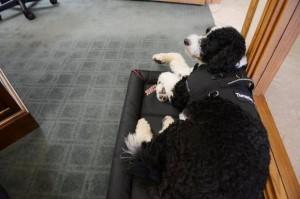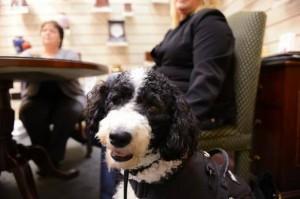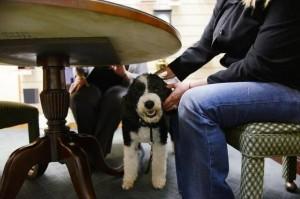 When the vest goes on over her shaggy black-and-white coat, Candy knows it’s time for work.
When the vest goes on over her shaggy black-and-white coat, Candy knows it’s time for work.
Candy, a grief therapy dog at Rest Haven funeral home in Rockwall, gets her canine kicks when she’s off-duty at the home of her frequent caretaker, Sharon Satterwhite. But at work, where Candy reports daily, the Portuguese water dog behaves calmly, within the guidelines of her training.
“She’s not allowed to run around and play at work, kind of like all of us,” said Satterwhite, who works as an assistant at Rest Haven.
Strict parameters and commands dictate 16-month-old Candy’s behavior, and whether she should seek to comfort guests or sit idly to the side. But sometimes instinct kicks in, like when she wandered off one day to find a man in the middle of making funeral arrangements, and put her head in his lap.
“She knows somehow. She has a sense of people who need a little bit of love,” Satterwhite said.
Candy is just getting started in her work at Rest Haven. As she finishes her training, Candy will take part in the funeral arrangement and visitation process, one of a growing line of dogs used in the funeral business and other fields to relieve stressful situations.
“Dogs just give unconditional love, and they will sit there and absorb all your sadness,” said Linda Marler, program coordinator with Baylor Health Care Animal Assisted Therapy. “You can sit and hold onto a dog, and it just makes you feel so much better.”
The idea to get Candy came from Rest Haven funeral director Maria Estes, who heard at an International Cemetery, Cremation and Funeral Association event about a Milwaukee funeral home that had a therapy dog named Oliver.

Oliver gained a following of sorts in Milwaukee, Krause said. Local TV stations did stories on the dog, and he appeared in commercials for the funeral home. Even a routine shopping trip after work attracted a crowd.
Krause’s funeral home used Oliver in funeral services, and he said Oliver helped a couple thousand families over the years.
“He made the place feel warm and inviting,” Krause said. “Funerals can tend to be the opposite.”
And after Oliver died at age 10 in December 2011, the Milwaukee Journal Sentinel published an obituary. Krause’s funeral home held a service for Oliver, and Krause said about 150 people came with their dogs or the ashes of their pets.
Krause said he knows of at least “a couple dozen” grief therapy dogs working at funeral homes as a result of Oliver, including ones in Cincinnati, Cleveland and Detroit.
Baylor Health Care’s therapy dog program started in 1985.
“Back then, you got a lot of naysaying from some of the physicians,” Marler said. “It was hard to get the dogs in some of the sites.”
Now, Marler said she’s getting phone calls from all over. The Baylor program has 94 dogs owned by volunteers, she said, with 32 visiting sites each week across the hospital system. The dogs can help to relieve anxiety in a waiting-room-like setting, or move forward outpatient physical therapy with kids.
Dewayne and Ann Cain, who own Rest Haven, supported getting Candy and the plan to use her as a full-time therapy dog at the funeral home. Candy came as a puppy from a breeder in Missouri, and Dewayne Cain surprised employees with the “new employee” dressed with a red bow.

The first call to duty for Candy came this spring, after the death of Patriot Paws founder Lori Stevens’ mother. Stevens said her mother had dogs, and having Candy at the visitation and funeral “broke the ice for everybody.”
“You don’t have to tell people how you feel, and everything’s OK,” Stevens said. “She’s going to love you anyway.”
Training is just about complete for Candy, although Satterwhite said it’ll take some practice to cement techniques. Rest Haven also plans to take her out into the community, to schools, nursing homes and special events.
On most days, Candy will make her rounds through the office, greeting staffers and people who come to the door while rarely barking, Satterwhite said. The people she’s greeted includes the man she found the one day in the middle of funeral arrangements, whose face, Estes said, lit up as he petted Candy.
“It makes you smile; you can’t help it,” Satterwhite said. “Even if you’re smiling through your tears.”
~ Via Dallas News
Tags: comfort dog, funeral dog, service dog, Therapy dog
